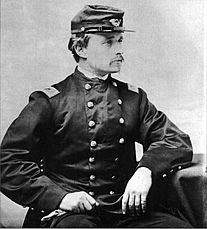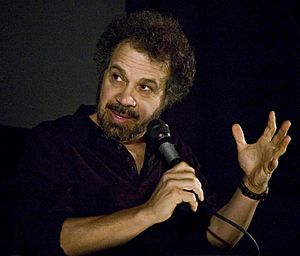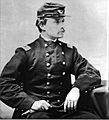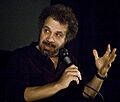Glory (1989 film) facts for kids
Quick facts for kids Glory |
|
|---|---|
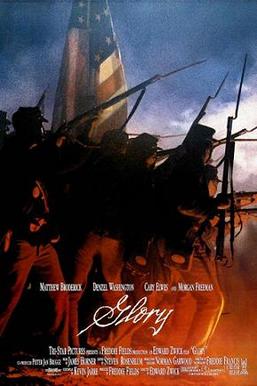
Theatrical release poster
|
|
| Directed by | Edward Zwick |
| Produced by | Freddie Fields |
| Screenplay by | Kevin Jarre |
| Starring | |
| Music by | James Horner |
| Cinematography | Freddie Francis |
| Editing by | Steven Rosenblum |
| Studio | Freddie Fields Productions |
| Distributed by | Tri-Star Pictures |
| Release date(s) | December 15, 1989 (Limited) February 16, 1990 (United States) |
| Running time | 122 minutes |
| Country | United States |
| Language | English |
| Budget | $18 million |
| Money made | $27 million |
Glory is a 1989 American history and war movie. It was directed by Edward Zwick. The film tells the story of the 54th Massachusetts Infantry Regiment. This was one of the first African-American regiments in the Union Army during the American Civil War.
The movie stars Matthew Broderick as Colonel Robert Gould Shaw, who leads the regiment. It also features Denzel Washington, Cary Elwes, and Morgan Freeman. They play made-up characters who are part of the 54th. The story was written by Kevin Jarre. It was based on books and letters from the time. The film shows the soldiers of the 54th from when they first formed. It follows them to their brave actions at the Second Battle of Fort Wagner.
Glory was made by Tri-Star Pictures and Freddie Fields Productions. It was released in the United States starting in December 1989. The movie earned $27 million worldwide. It was nominated for five Academy Awards and won three. Denzel Washington won the Best Supporting Actor award for his role. The film also won awards from other groups like the Golden Globe Awards.
Contents
Movie Story: Fighting for Freedom
After being hurt at the Battle of Antietam, Captain Robert Gould Shaw goes home to Boston. His father helps him become a colonel of the 54th Massachusetts Infantry Regiment. This was one of the first all-black regiments in the Union Army. Shaw chooses his friend, Cabot Forbes, to be his second-in-command.
Their first volunteer is Thomas Searles, a smart, free African-American man. Other recruits include John Rawlins, Jupiter Sharts, Silas Trip, and a quiet teenage drummer boy.
Training and Challenges
The men learn that the Confederacy has made a rule. Captured black soldiers will be sent back to slavery. White officers leading black soldiers will be executed. Shaw offers to let anyone leave if they don't want to fight. But no one takes his offer.
Sergeant-Major Mulcahy trains the men very strictly. He is especially tough on Searles. Shaw sees that this hard training is needed to get them ready for battle.
Standing Up for Rights
One soldier, Trip, leaves the camp to find proper shoes. His men are not getting the supplies they need. Shaw confronts the base's quartermaster about this unfair treatment. He makes sure his men get their supplies.
Shaw also supports his men in a pay dispute. The government says black soldiers will only get $10 a month. White soldiers get $13. In protest, the men, led by Trip, tear up their pay vouchers. Shaw tears up his own voucher too. He says no white officers will take pay either. Because of his leadership, Rawlins is promoted to sergeant major.
First Battles
After their training, the 54th is sent to serve under General Charles Garrison Harker. Their first order is to burn a town called Darien, Georgia. This order comes from Colonel James Montgomery. Shaw at first refuses to obey this unlawful order. But he agrees when threatened with being removed from command.
Shaw keeps asking his leaders to let his regiment fight. For weeks, they have only been doing hard manual labor. Shaw finally gets the 54th a combat job. He threatens to tell the War Department about Harker and Montgomery's illegal money-making.
In their first real battle at James Island, South Carolina, the 54th fights well. They stop a Confederate attack that had defeated other units. During this battle, Searles is hurt. But he saves Trip from being stabbed. Shaw offers Trip the honor of carrying the regimental flag in battle. Trip refuses, unsure if winning the war will truly make life better for former slaves.
The Attack on Fort Wagner
General George Strong tells Shaw about a big plan. They will attack Morris Island to capture Fort Wagner. The only way to reach the fort is across an open beach. A charge there will cause many deaths. Shaw volunteers the 54th to lead this dangerous attack.
The night before the battle, the black soldiers have a religious service. Several men give emotional speeches. Trip finally feels like he belongs with his fellow soldiers. On their way to the battlefield, other Union troops cheer for the 54th. These were the same troops who had looked down on them before.
The 54th leads the charge on the fort at dusk. They suffer many losses. As night falls, the regiment is stuck against the fort's walls. Shaw tries to encourage his men forward. He is hit by many bullets and killed. Trip, despite his earlier doubts, picks up the flag. He tries to rally the men but is also shot dead.
Forbes and Rawlins take charge. The soldiers break through the fort's outer defenses. They seem close to winning. But Forbes, Rawlins, Searles, Sharts, and the two color sergeants see that the enemy has cannons pointed right at them.
The next morning, the beach is covered with dead Union soldiers. The Confederate flag flies over the fort. The dead Union soldiers are buried together in a large grave. Shaw and Trip's bodies are buried side by side.
Aftermath of the Battle
The movie ends by saying that the 54th regiment lost more than half its men in the attack. Fort Wagner was never captured by the Union Army. However, the bravery of the 54th showed everyone what black soldiers could do. Their courage led Congress to allow more black soldiers to join the Union Army. Over 180,000 black men volunteered. President Abraham Lincoln later said they helped turn the tide of the war.
Main Characters
- Matthew Broderick as Colonel Robert Gould Shaw: The young, white officer who leads the 54th Massachusetts.
- Denzel Washington as Private Silas Trip: A strong-willed former slave who struggles with trusting white officers.
- Cary Elwes as Major Cabot Forbes: Shaw's loyal friend and second-in-command.
- Morgan Freeman as Sergeant Major John Rawlins: A wise and respected older soldier who becomes a leader among the men.
- Andre Braugher as Corporal Thomas Searles: A well-educated, free black man who joins the regiment.
- Jihmi Kennedy as Private Jupiter Sharts: Another soldier in the regiment.
- RonReaco Lee as Mute Drummer Boy: A young, quiet soldier.
Making the Movie
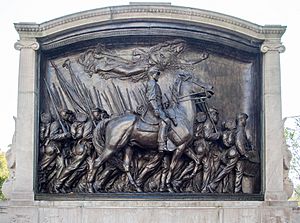
The idea for Glory came from Kevin Jarre seeing a monument in Boston Common. This monument honored Colonel Shaw and the 54th Massachusetts Volunteer Infantry. The 54th was the first official Union Army unit made up entirely of African-American soldiers. All of their officers were white. Jarre's story was based on books and the personal letters of Robert Gould Shaw.
The movie was filmed mostly in Massachusetts and Georgia. The opening scenes, showing the Battle of Antietam, used military reenactors. Director Edward Zwick wanted to make sure Glory was about the 54th Regiment. He didn't want it to be just a story about a white hero. Actor Morgan Freeman said, "This is a picture about the 54th Regiment, not Colonel Shaw, but at the same time the two are inseparable."
Glory was one of the first major movies to show black U.S. soldiers fighting for their freedom during the Civil War.
Movie Music
| Glory: Original Motion Picture Soundtrack | |
|---|---|
| Film score by | |
| Released | November 1, 1990 |
| Length | 43:21 |
| Label | Virgin |
The music for Glory was created by James Horner. It was released as a soundtrack album on January 11, 1990. The Boys Choir of Harlem also helped with the music.
Awards and Recognition
Glory won many awards in 1989 and 1990.
- It won three Academy Awards:
- Best Supporting Actor for Denzel Washington.
- Best Cinematography for Freddie Francis.
- Best Sound.
- It also won a Golden Globe for Denzel Washington.
- The film was recognized by the NAACP Image Awards for being an outstanding movie.
- The American Film Institute has listed Glory as one of the most inspiring movies of all time.
Images for kids
-
Colonel Robert Gould Shaw in May 1863
-
Memorial at Boston Common by Augustus Saint-Gaudens
See also
 In Spanish: Glory para niños
In Spanish: Glory para niños
 | Madam C. J. Walker |
 | Janet Emerson Bashen |
 | Annie Turnbo Malone |
 | Maggie L. Walker |


